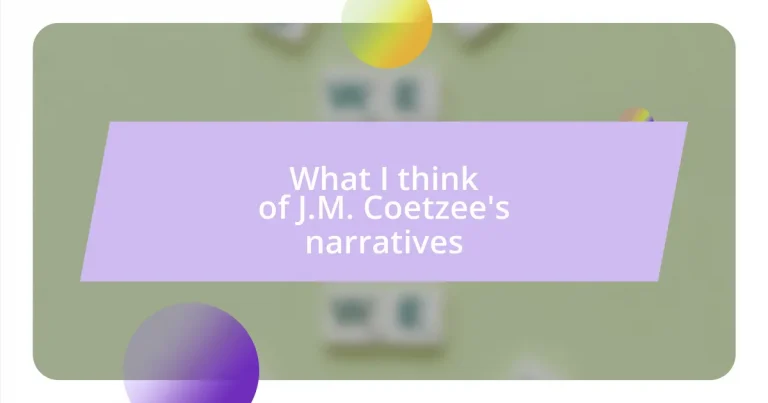Key takeaways:
- Coetzee’s narratives explore profound themes such as power dynamics, moral ambiguity, identity, and societal injustices, encouraging readers to reflect on their own beliefs and values.
- Character development is intricate and layered, with complex protagonists like David Lurie and Elizabeth Costello embodying both virtues and flaws, prompting relatable reflections on the human experience.
- Coetzee employs unique narrative techniques, including unreliable narrators and minimalist prose, which heighten emotional resonance and provoke philosophical contemplation.
- His storytelling invites introspection, often leaving readers grappling with challenging moral questions and uncomfortable truths about themselves and society.
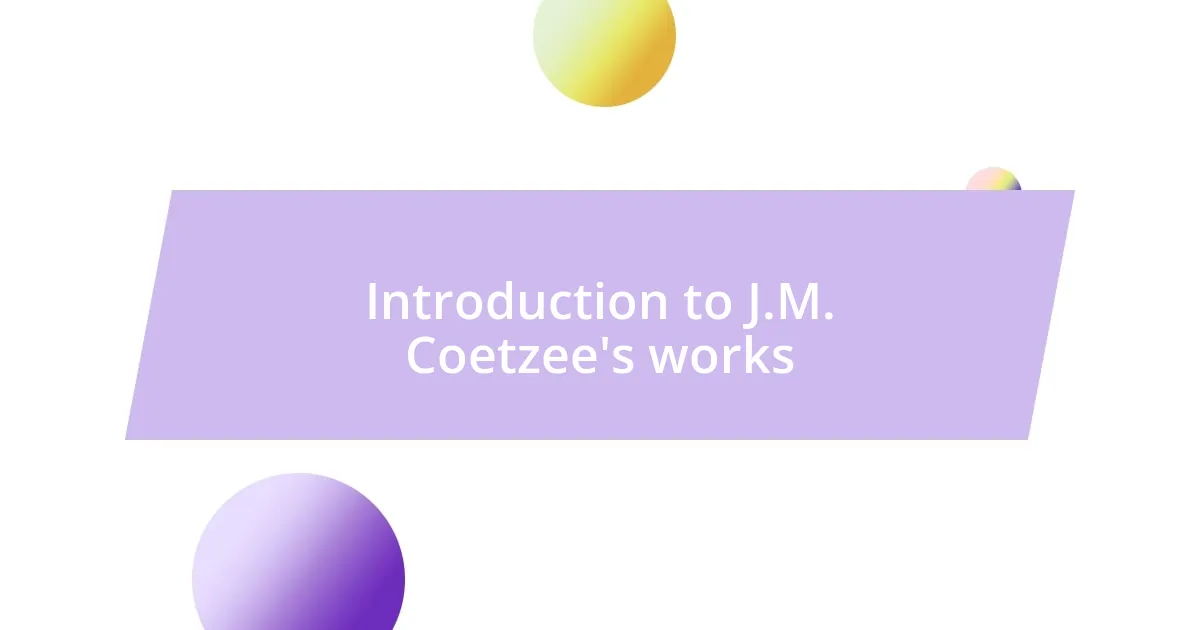
Introduction to J.M. Coetzee’s works
J.M. Coetzee is a compelling voice in contemporary literature, capturing the complexities of human experience through his unique narrative style. His works often shine a piercing light on themes of power, identity, and morality, reflecting South Africa’s turbulent history. I remember the first time I encountered “Disgrace”; it left me with a profound sense of discomfort, pushing me to question my own values and beliefs.
In Coetzee’s narratives, the characters are not mere vessels; they grapple with their inner dilemmas and societal expectations, inviting readers into their struggles. Isn’t it fascinating how a writer can make us confront our own assumptions? I often find myself reflecting on the characters long after I’ve closed the book, as if they became a part of my own story.
His prose is deceptively simple, yet it carries a weight that lingers. With each sentence, he crafts an intimate connection with the reader, crafting a space where reflection is both inevitable and necessary. I can’t help but admire how he weaves intense emotions into seemingly ordinary events, making us reconsider the essence of our experiences. Coetzee’s works are not just stories; they are a mirror, urging us to look deeper into ourselves and the world around us.
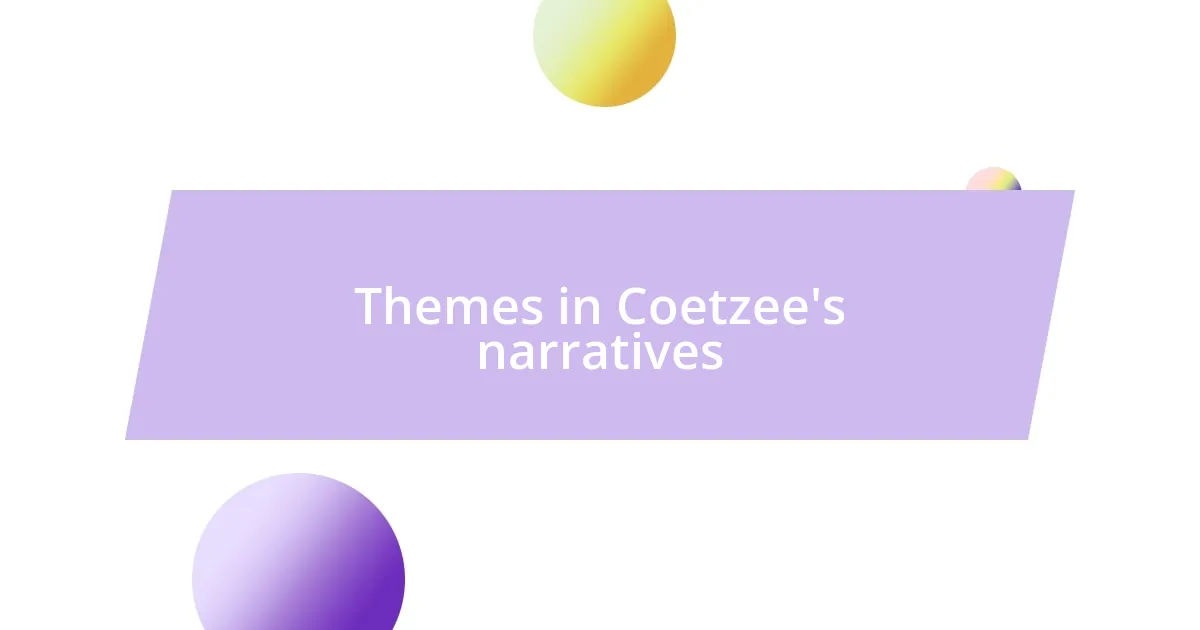
Themes in Coetzee’s narratives
Coetzee’s narratives dive deep into the intricate layers of power dynamics and moral ambiguity. I find it striking how he often places ordinary people in extraordinary situations, forcing them to confront their own complicity in societal injustices. For instance, when I read “Waiting for the Barbarians,” I was struck by the haunting portrayal of the colonizer and the colonized, and it made me question everything I thought I understood about justice and morality.
Here are some recurring themes in Coetzee’s narratives:
- Power and Oppression: Examining the struggles between authority and the individual.
- Identity and Self-perception: Characters often grapple with their own sense of self against societal labels.
- Morality and Ethics: The blurring lines between right and wrong create moral dilemmas.
- Exile and Belonging: Many characters experience physical or emotional displacement, exploring the nature of home.
- Violence and Redemption: The cycle of violence often intertwines with quests for personal or societal redemption.
These themes resonate deeply with readers, sometimes prompting a visceral reaction. I still recall how I felt a mix of anger and empathy while navigating through the lives of Coetzee’s characters, laying bare the uncomfortable truths of our shared humanity.
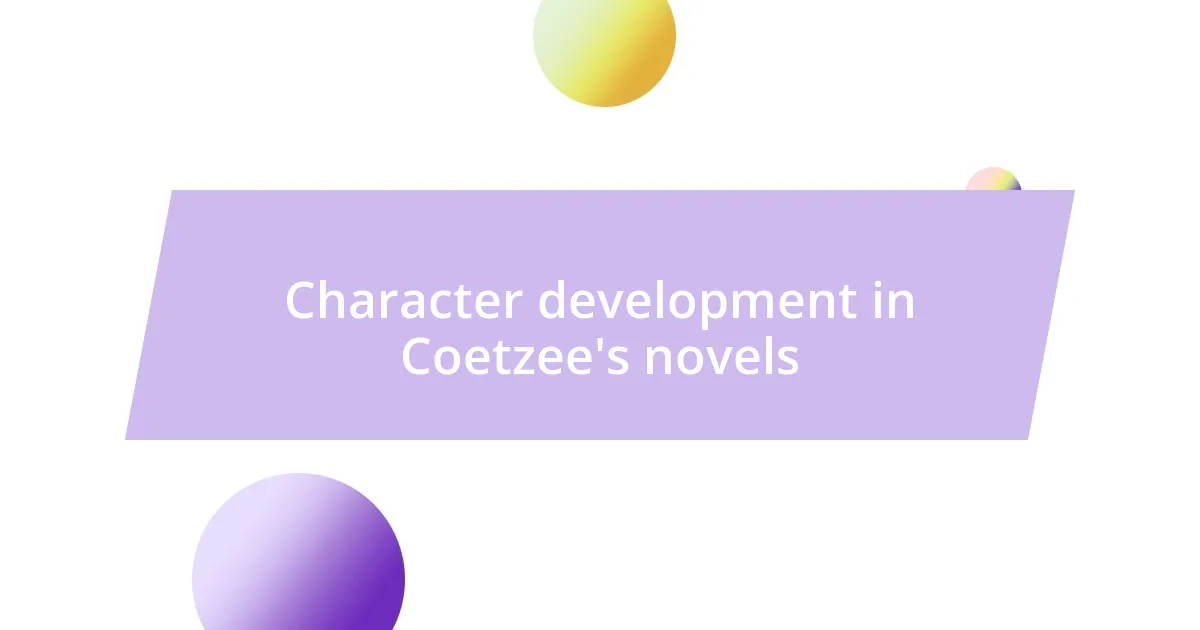
Character development in Coetzee’s novels
Coetzee’s character development is intricately layered, often revealing the complexities of human emotion and moral ambiguity. I’ve noticed how each character, whether protagonist or antagonist, embodies a spectrum of virtues and flaws that make them relatable. Take the character of David Lurie in “Disgrace,” for instance. His evolution throughout the novel left me grappling with conflicting feelings of sympathy and disdain, illustrating Coetzee’s masterful ability to portray flawed humanity.
In many of his novels, characters undergo profound transformations, shaped by their experiences and the often unforgiving world around them. I remember feeling a deep connection to the character of Elizabeth Costello, who navigates her own existential crises while challenging societal norms. Coetzee does not shy away from showcasing vulnerability, allowing readers to see their own struggles mirrored in the lives of his characters. It’s a humbling experience, prompting reflection on my personal attitudes and beliefs.
Moreover, the internal conflicts faced by Coetzee’s characters often parallel their external struggles with society. The rich inner dialogues create a tapestry of thought that leaves an indelible mark on the reader. I can recall the lingering thoughts I had after reading “The Age of Iron,” where the character of Mrs. Curren wrestles with illness and a disintegrating society. It exemplified how character development in Coetzee’s novels isn’t merely about plot progression, but a profound exploration into the human psyche.
| Character | Development |
|---|---|
| David Lurie | Embodies moral ambiguity and transformation, invoking sympathy and disdain. |
| Elizabeth Costello | Challenges societal norms while navigating existential crises, deepening reader connection. |
| Mrs. Curren | Represents internal conflicts reflected against societal decay, emphasizing profound introspection. |
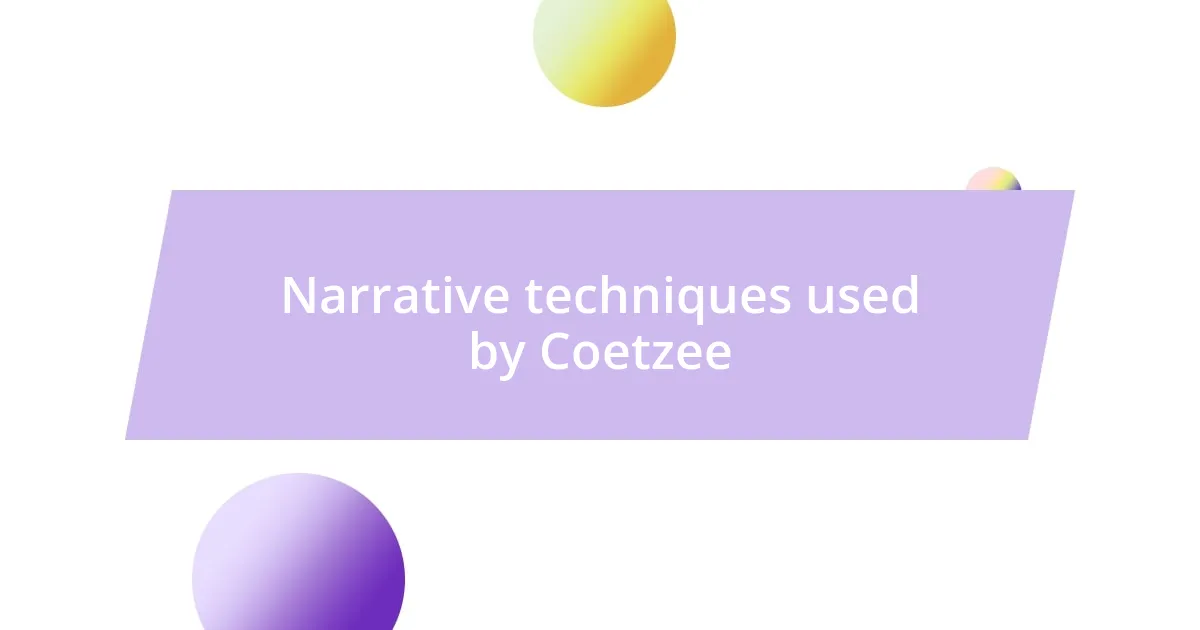
Narrative techniques used by Coetzee
Coetzee employs a unique blend of narrative techniques that shape the reader’s experience and understanding. One of the methods that stands out to me is his use of unreliable narrators. This technique invites readers to question the truth behind the characters’ perceptions. While grappling with the narrative of “Disgrace,” I found myself constantly asking, “Can I trust David Lurie’s perspective?” It pushed me to dig deeper into the subtext and uncover the intricate nuances of his moral failures.
Another fascinating aspect of Coetzee’s narrative style is his ability to intertwine philosophical reflection with storytelling. He doesn’t just tell a story; he provokes contemplation on heavy themes like ethics and identity. In “The Life and Times of Michael K,” I felt a profound connection as Michael’s simple yet profound quest for belonging mirrored my own reflections on existence. Coetzee’s prose becomes a vehicle for exploration, turning the narrative into a dialogue with the reader.
Additionally, I appreciate how Coetzee often employs a minimalist approach. His sparse language and careful pacing may seem deceptively simple, yet they carry immense emotional weight. When I read “Waiting for the Barbarians,” the deliberate slowness of events made me acutely aware of the tension in each moment. It’s as though Coetzee invites us to savor the discomfort, forcing us to confront the harsher realities of our world. Through these techniques, he fosters an experience that is both intellectually challenging and emotionally resonant.
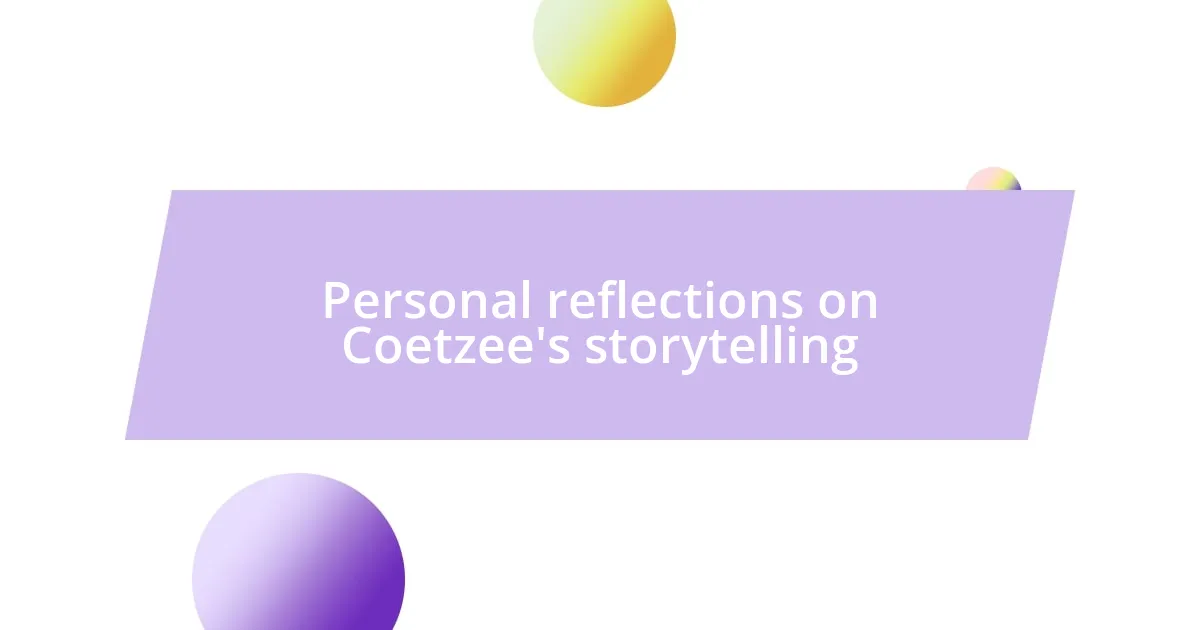
Personal reflections on Coetzee’s storytelling
Coetzee’s storytelling often leaves me in a reflective state, as I find myself questioning my own beliefs. For instance, the moral dilemmas faced by characters resonate with my personal experiences, creating a sense of discomfort that compels me to examine my own choices. I often ask myself, “What would I do in their shoes?” This introspective questioning makes his narratives both engaging and unsettling.
Reading Coetzee sometimes feels like an emotional journey rather than just a narrative. I vividly recall the heavy weight of Mrs. Curren’s despair in “Age of Iron.” Her struggles forced me to confront my feelings towards issues of injustice and mortality, bringing a rawness to my understanding of societal issues. Have you ever found a character reflecting your own vulnerabilities so clearly? That’s exactly how I felt, as if Coetzee was holding a mirror to my soul.
I also appreciate how Coetzee’s prose invites quiet contemplation. Each word feels deliberate, requiring me to slow down and fully absorb the weight of his ideas. In moments where I’ve skimmed through narratives in other books, with Coetzee, I’m almost compelled to pause and reflect. This deliberate pacing creates an atmosphere that amplifies the emotional intensity of the story, making every revelation feel profound and impactful. It’s a reminder that good storytelling can be as much about what’s unsaid as it is about the plot itself.
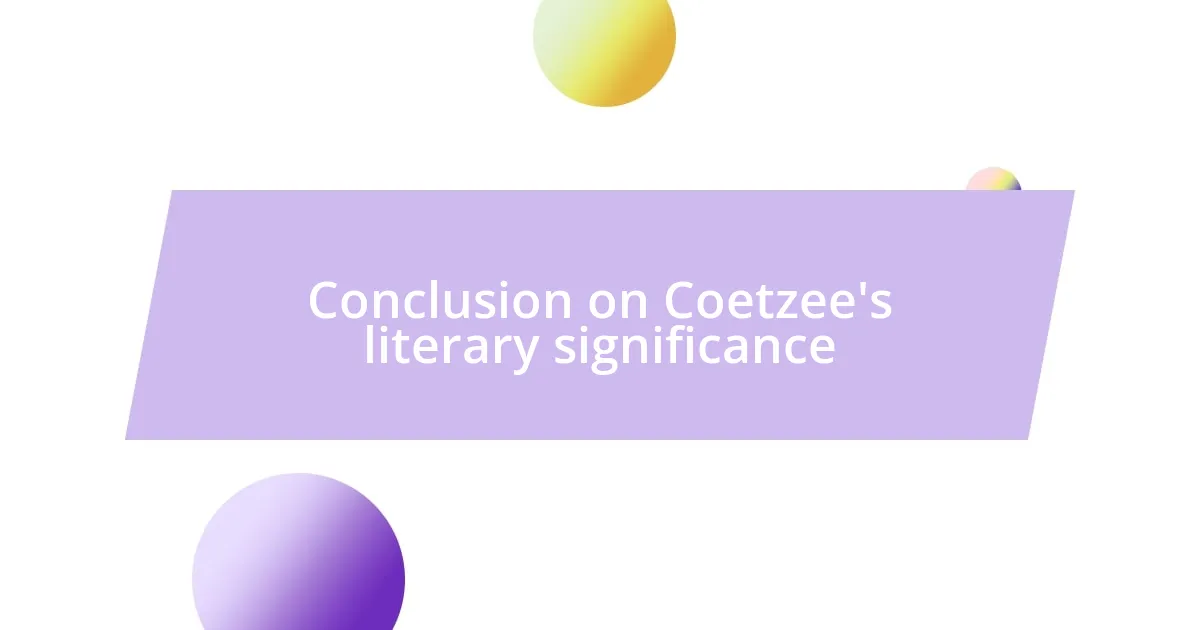
Conclusion on Coetzee’s literary significance
Coetzee’s literary significance is deeply rooted in his ability to provoke thought and inspire introspection. Each narrative I’ve encountered feels like a complex puzzle, challenging me to piece together the moral landscapes his characters navigate. I often wonder how authors can craft such intricate worlds that resonate so personally. For me, Coetzee stands out as a master at this, turning reading into an exploration of not only the text but also of the self.
His nuanced portrayal of ethical dilemmas forces readers to engage with uncomfortable truths. After finishing “Disgrace,” I couldn’t shake the feeling of discomfort in my own convictions. It left me pondering questions like, “What defines redemption?” and “Am I ready to confront my own moral shortcomings?” These reflections linger long after I close the book, illustrating how Coetzee’s work impacts my understanding of humanity and society.
Moreover, Coetzee’s skillful balance of minimalism and emotional depth is remarkable. I still remember the ache I felt during pivotal moments in “Waiting for the Barbarians.” His deliberate pacing created an almost palpable tension that drew me in, making me feel as though I was not merely a spectator but an active participant in the unfolding drama. How can a few sparse words evoke such powerful emotions? This thoughtful use of language elevates Coetzee’s narratives beyond mere storytelling; they become a call to deeper reflection on justice, identity, and our place in the world.












